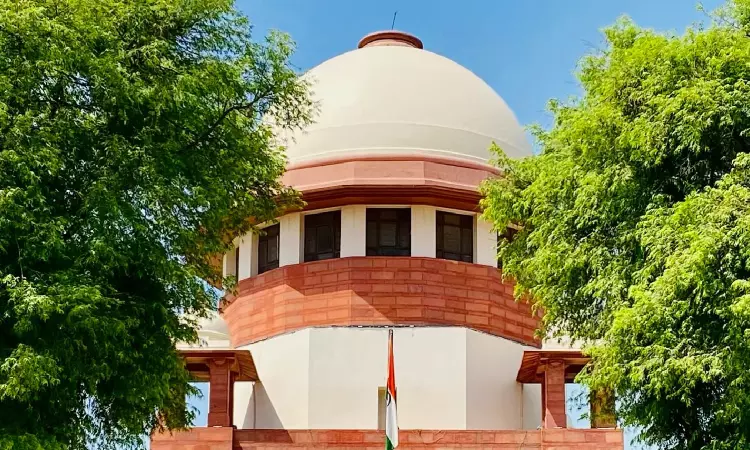- Home
- /
- Supreme court
- /
- Order XXI Rule 102 CPC Bar Not...
Order XXI Rule 102 CPC Bar Not Applicable To Party Who Purchased Suit Property Not From Judgment-Debtor : Supreme Court
Yash Mittal
28 Aug 2025 11:52 AM IST
A party who purchased the suit property from a third-party can resist the execution under Rule 97 of Order XXI CPC.
The Supreme Court recently clarified that the bar under Order XXI Rule 102 CPC, which prevents a pendente lite transferee from the judgment-debtor from resisting execution of a decree, does not apply where the objection is raised by a transferee from a third party, who was not a party to the suit.The Court observed that the bar under Order XXI Rule 102 CPC doesn't apply to objection raised by...
The Supreme Court recently clarified that the bar under Order XXI Rule 102 CPC, which prevents a pendente lite transferee from the judgment-debtor from resisting execution of a decree, does not apply where the objection is raised by a transferee from a third party, who was not a party to the suit.
The Court observed that the bar under Order XXI Rule 102 CPC doesn't apply to objection raised by the transferee from third parties, who were not party to the original suit. The Court added that the transferees from third parties, are entitled to protection under Sections 97-98 CPC, and can raise objection against the execution of decrees subject to the satisfaction of the conditions mentioned therein.
“However, Rule 102 of Order XXI applies only to a person to whom the judgment-debtor has transferred the immovable property which was subject matter of that suit pendente lite. If the person who is resisting or obstructing the execution of the decree for possession of such property, is not the transferee of judgment debtor, i.e. he does not trace his title from judgment-debtor, bar of Rule 102 does not apply to him. That is to say that if the person who is resisting or obstructing the decree for possession has received the property from person other than the judgment-debtor, such person is competent to gain the benefit of Rules 97 to 101 of Order XXI. In fact, he is entitled to such benefit even if he had been transferred the immovable property pendente lite, i.e. during the pendency of the suit, in which the decree was passed.”, the court said.
The Case
The bench comprising Justices Vikram Nath and Sandeep Mehta heard the case where the Appellant, being a transferee from a third party, was aggrieved by the Bombay High Court's decision to dismiss the objections raised by him under Order XXI Rule 97 CPC against the execution of the decree related to a suit property granted in favour of the Respondent.
The Respondent was a leaseholder, and the suit property was transferred multiple times via a sale deed. The Appellant received the suit property from one M/s Rizvi Estate, and claimed that since the seller was a third party, and not a party to an original suit, therefore the transfer made to him was a transfer from a third party, leading to non-application of bar under Order XXI Rule 102 CPC.
Decision
Setting aside the High Court's decision, the judgment authored by Justice Vikram Nath observed that the since Appellant derived title not from the judgment-debtors but from Rizvi Estate, an independent purchaser in 1988. Therefore, Rule 102 could not bar his objections against the execution of decree.
“The appellant in the present case does not trace his title from the judgment-debtor, i.e. the Maliks and therefore, he is not a transferee pendente lite of the judgment-debtor. The appellant is a bona fide buyer who had bought the suit property from M/s Rizvi Estate and Hotels Pvt. Ltd., vide registered sale deed dated 24th April, 2007, who traced their title from the original owner, Mrs. Misquita, vide registered sale deed dated 16th January, 1988. The transferor, M/s Rizvi Estate and Hotels Pvt. Ltd., of the appellant was not a party to the suit bearing Special Civil Suit No. 97/1996/B, the decree of which has been put to execution. They were third party, having received the ownership rights from the original owner in 1988. Thus, even if the appellant did buy the subject-property in 2007, during the pendency of the suit between the Maliks and the present respondents, the bar of Rule 102 of Order XXI does not affect or prohibit the appellant from raising his objections before the Executing Court under Rules 97 and 101 and subsequently receive its adjudication under Rules 98 and 100.”, the court observed.
The Court explained why Rule 102 of Order XXI applies only to a transferee from the judgment debtor:
“Rule 102 of Order XXI intends to protect the interests of the decree-holder against the attempts of unscrupulous judgment-debtors and their subsequent transferees who indulge in activities and leave no stone unturned to deprive the decree-holders from reaping the benefits of the decree granted in their favour. The Rule being equitable in nature, therefore, estops further creation of rights as it explicitly states that nothing in Rules 98 and 100 shall apply to the resistance or obstruction being made by the transferee pendente lite of judgment-debtor.”
Accordingly, the appeal was allowed, and the executing court was directed to proceed with the enquiry, conclude the same and bring it to its logical conclusion in accordance with law.
Cause Title: TAHIR V. ISANI VS. MADAN WAMAN CHODANKAR, (SINCE DECEASED) NOW THROUGH HIS LEGAL REPRESENTATIVES & ORS
Citation : 2025 LiveLaw (SC) 845
Click here to read/download the judgment
Appearance:
For Appellant(s) : Mr. Ninad Laud, Adv. Mr. Ivo Dcosta, Adv. Mr. Guruprasad Naik, Adv. Ms. Ishani Shekhar, Adv. Mr. Sahil Tagotra, AOR
For Respondent(s) : Mr. Yashraj Singh Deora, Sr. Adv. Mr. Priyesh Mohan Srivastava, Adv. M/S. Mitter & Mitter Co., AOR



